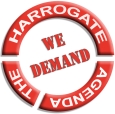
Yesterday, Iain Martin in the Telegraph caught my eye with the article above. Having been pondering the Scotland independence campaign in recent days and what we are learning from it, with a view to covering it on this blog – and given the added UKIP dimension – it was of interest to see where he would go with his piece.
To be honest Martin didn’t add much if anything to our understanding of the dynamics at play north of the border. But his opinion regarding UKIP’s fortunes and by extension those of Nigel Farage did make one eyebrow rise somewhat. As Martin opines:
It is curious that Salmond should be blowing up just as Nigel Farage starts to blow up. The two great guerilla leaders of our age – both expert at mounting effective raids on Westminster and discombobulating their much bigger opponents – are in trouble.
This is a ridiculous assertion. UKIP has never even come close to mounting a raid on Westminster. While the SNP has most seats in the Scottish Parliament and also returns MPs to Westminster, UKIP has a relatively small number of councillors in England and Wales and has only once come within a couple of thousand votes of ever having an MP elected under the party’s banner (Eastleigh). However, setting aside such a daft claim, Martin did rehearse a point that we have made on this blog several times:
Ukip looks as though it has hit a ceiling in terms of attracting support. Its attempts to eat into the Labour vote are, so far, misfiring. The party was also running third in a recent poll on the Euro elections, and the Tory claim that a vote for Farage is a vote for Miliband and a Europhile Labour government looks increasingly potent.
We have mentioned this glass ceiling effect previously and all the current polling bears it out. The trend of UKIP support in the polling numbers is downward and even in the party leader ratings, Nigel Farage has seen his number decline. There is simply no sign of UKIP being close to breaking through and significantly increasing its stock.
The reasons why we believe UKIP is stuck in second gear on the political motorway have been covered in detail here over many months. But what is worth noting today is the extent to which UKIP’s supporters, the vocal ones who lurk on the Telegraph’s comment threads seeking out criticism to attack, could be responsible for a lack of improvement in the party and letting Farage and his top team get away with poor performance at a time when the party should genuinely be surging ahead.
Looking at this subset of UKIP supporters, we can see from their contributions they are angry about Martin’s observations. They refuse to deviate from their view that UKIP is on a surge, they see his piece as an attack on UKIP requiring an all-out retaliatory assault while at the same time accusing the media of circling the wagons around the main parties, they are desperate to state time and again that the party increased its vote five-fold in Wythenshawe to come second only to Labour, and a number of them claim that the almost the entire postal vote was fraudulent and that this robbed them of victory.
Is it any wonder the party leadership is able to actively resist change and improvement when in the eyes of an extremely vocal minority of members the party and its leadership does no wrong and when things go badly it’s always someone else’s fault or the result of a vicious conspiracy? Let me explain by taking the points above in turn.
The fact is all the polls still show UKIP bumping along within a point or so of 13% nationally. There are exceptions in some constituencies of a particular political composition where the party scores higher, but despite this they have been rooted around 13% for a while, having seen a drop from their polling highs around May last year. This is in no way a surge that they claim it to be. Arguing there is a surge merely ignores the evidence.
Perhaps Martin’s piece was an attack. Journalists have reader numbers in mind, it’s all about the traffic they can drive, so anything that stirs a reaction and draws in more readers is grist to the mill. Of course, Labour, the Tories and Lib Dems have all been attacked at some point and their supporters resent it, often biting back. But UKIP supporters act as if attacks have never happened before in politics and believe they are under so concerted an attack it is as if the very core of their being and everything they believe in is at risk of destruction. The resulting aggression and spite this sparks, as evidenced in their outpourings, is truly a sight.
The meme that is circulating in newspapers and blogs, that UKIP increased its vote in Wythenshawe five-fold, is a masterclass in spin. A candidate who only got 2 votes could increase their vote five-fold next time around and it would still only be miniscule at 10. UKIP supporters don’t like seeing the cold hard fact that they polled only 4,301 votes and although placed second, the party was so far behind Labour it was an irrelevance in the contest. This is despite the UKIP vote being mobilised and motivated to turn out. Before the election some of these people were declaring Wythenshawe to be in play and a possible UKIP gain! Any attempt to point this out then moves smoothly to the next item on the list…
It requires quite a flight from reality to argue that the overwhelming majority of postal votes that went to Labour were fraudulent and that if people had to vote in person and produce ID, the ballot would have been much closer. But that is what is being said in UKIP supporter circles. The clear implication is that Asians in the constituency have engaged in electoral fraud and therefore stitched up UKIP. No evidence has been provided and they say the establishment would ignore it anyway because it resulted in UKIP falling badly at the hurdle.
Farage and Co must love this. These arguments let them completely off the hook for such a piss poor performance against a backdrop of real anger at the main parties. While a small number who have rejected the main parties in frustration have indeed gone into the UKIP camp, UKIP is not picking up the majority of those who are turning their backs, because it is being seen as just another party that is no different to the rest.
It could have been so much different and it should be so much different.
‘Stop sniping from the sidelines, get on board, get behind us and influence the leadership if you want to change the approach’, is a mantra often heard from vocal UKIPpers who object to such observations and any criticism. Incidentally they never engage on the substance of the criticism, but the details above show they never will because they are in an echo chamber, inhabiting a parallel plane where things like facts are dismissed with a sneer and promises of an earthquake to come are made.
But how could anyone try to change things from the inside when the leadership, irrespective of fault or error, is blessed with reinforcing confirmation bias in its totality from people who have gone beyond loyal and behave with quasi-religious reverence for the leadership and repeat every utterance as an inviolable truth that must not be questioned?
Where people cannot see any fault at all, there is no pressure on the party leadership to get its act together. This is why UKIP is where it is. This is why Iain Martin, for all his own failings, got the thrust of his piece correct.
This idea that too many in UKIP are deluding themselves about the party’s performance and prospects, has been given more credence by a YouGov ‘Voting Intention Predictions’ exercise – as covered by Political Betting – where people were asked to say where in the polls the main parties will be at the end of 2014.
While supporters of the four largest parties all rated the prospects of their own party more highly than supporters of other parties did, the predictions from UKIP supporters really stand out from the rest, as you can see below – believing they will have double the polling numbers supporters of any other party predict for them.

Until they return to the real world, UKIP supporters, not just the leadership, will see to it that the party never develops and never breaks the mould. They are no longer an insurgency, they are just another party.



























What’s on your Mind?